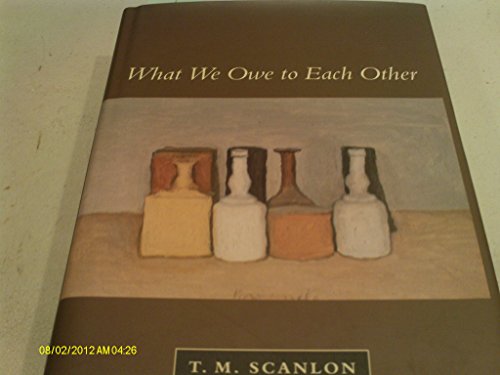Items related to What We Owe to Each Other

Synopsis
How do we judge whether an action is morally right or wrong? If an action is wrong, what reason does that give us not to do it? Why should we give such reasons priority over our other concerns and values? In this book, T. M. Scanlon offers new answers to these questions, as they apply to the central part of morality that concerns what we owe to each other. According to his contractualist view, thinking about right and wrong is thinking about what we do in terms that could be justified to others and that they could not reasonably reject. He shows how the special authority of conclusions about right and wrong arises from the value of being related to others in this way, and he shows how familiar moral ideas such as fairness and responsibility can be understood through their role in this process of mutual justification and criticism.
Scanlon bases his contractualism on a broader account of reasons, value, and individual well-being that challenges standard views about these crucial notions. He argues that desires do not provide us with reasons, that states of affairs are not the primary bearers of value, and that well-being is not as important for rational decision-making as it is commonly held to be. Scanlon is a pluralist about both moral and non-moral values. He argues that, taking this plurality of values into account, contractualism allows for most of the variability in moral requirements that relativists have claimed, while still accounting for the full force of our judgments of right and wrong.
"synopsis" may belong to another edition of this title.
About the Author
T. M. Scanlon is Alford Professor of Natural Religion, Moral Philosophy, and Civil Polity at Harvard University.
Reviews
Scanlon offers a sharp challenge to much contemporary moral philosophy. Most philosophers think that agreements between people play only a subsidiary role in moral theory. What is right or wrong is independent of what people accept. Agreements rest on morality; they do not underlie it. Scanlon dissents. In his conception, morality depends on principles it would not be reasonable for people to reject. These agreements do not derive from further moral facts. Scanlon also challenges the view that desires give reasons for action, leveling heavy artillery at the contrary position of Bernard Williams. The originality, scope, and careful argument of this work mark it as an indispensable book.?David Gordon, Bowling Green State Univ., OH
Copyright 1999 Reed Business Information, Inc.
"About this title" may belong to another edition of this title.
US$ 6.00 shipping within U.S.A.
Destination, rates & speedsSearch results for What We Owe to Each Other
What We Owe to Each Other
Seller: Funky Fox Books, HARLINGEN, TX, U.S.A.
Hardcover. Condition: Good. Hardcover, 8vo., 420 pp. Ex-Lib, with usual faults, otherwise a clean, tight copy in dustjacket. Seller Inventory # 000828
Quantity: 1 available
What We Owe to Each Other
Seller: ThriftBooksVintage, Tukwila, WA, U.S.A.
Hardcover. Condition: Very Good. No Jacket. Minor shelf and handling wear, overall a clean solid copy with minimal signs of use. Binding is tight and structurally sound. Clean interior pages. Secure packaging for safe delivery. 1.72. Seller Inventory # 1877107965
Quantity: 1 available
What We Owe to Each Other
Seller: ThriftBooksVintage, Tukwila, WA, U.S.A.
Hardcover. Condition: Good. No Jacket. Ex-Library copy with typical library marks and stamps. First edition THUS, third printing. Shelf and handling wear to cover and binding, with general signs of previous use. Covers show creasing and edgewear. Interior pages clean and unmarked. Secure packaging for safe delivery. 1.72. Seller Inventory # 1243262238
Quantity: 1 available
What We Owe to Each Other
Seller: Better World Books Ltd, Dunfermline, United Kingdom
Condition: Very Good. Ships from the UK. Used book that is in excellent condition. May show signs of wear or have minor defects. Seller Inventory # 4121039-6
Quantity: 1 available
What we owe to each other
Seller: Le-Livre, SABLONS, France
Couverture souple. Condition: bon. RO60152537: 1998. In-8. Broché. Bon état, Couv. convenable, Dos satisfaisant, Papier jauni. 42p ages. Texte en anglais. Quelques rousseurs. Jaquette correcte. Annotation au marqueur en tranche en pied. Avec Jaquette. . . Classification Dewey : 420-Langue anglaise. Anglo-saxon. Seller Inventory # RO60152537
Quantity: 1 available
What We Owe to Each Other
Seller: Toscana Books, AUSTIN, TX, U.S.A.
Hardcover. Condition: new. Excellent Condition.Excels in customer satisfaction, prompt replies, and quality checks. Seller Inventory # Scanned0674950895
Quantity: 1 available

